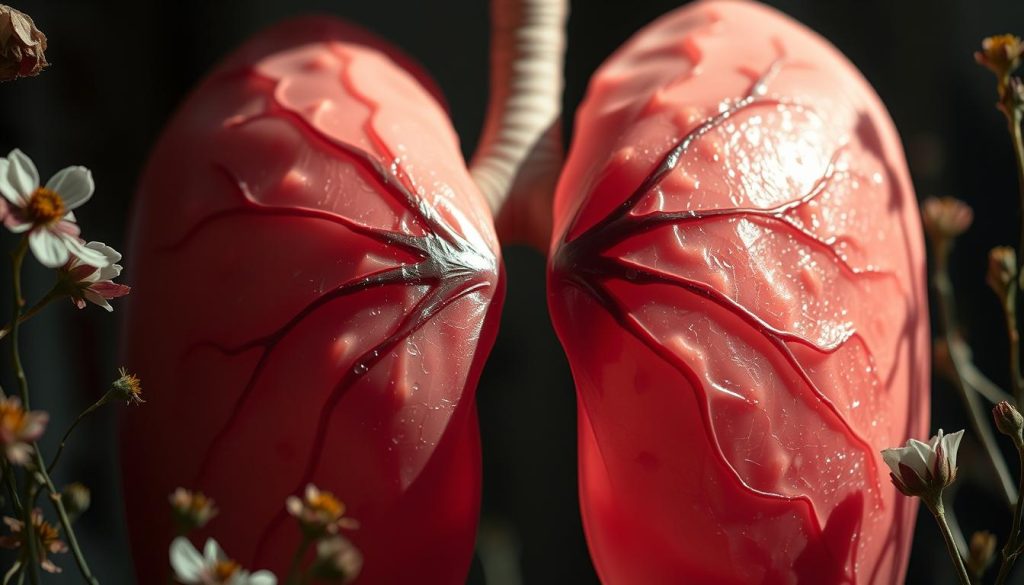Spotting lung cancer symptoms early can save lives. A cough that lasts or sudden breathing trouble might not be just a cold. These signs could mean a serious health issue.
Lung cancer often starts without clear symptoms. It’s vital to watch for any unusual breathing or health changes. Signs like a persistent cough or feeling very tired could be warning signs.
Knowing about lung cancer symptoms helps you act fast. If you notice ongoing health issues, get medical help right away. Early action is key to beating this tough disease.
Understanding Lung Cancer and Its Early Detection
Lung cancer is a serious disease that affects thousands of Americans each year. Knowing the types, risk factors, and importance of early detection can help save lives. Let’s explore these aspects to better understand this condition.
Types of Lung Cancer
There are two main types of lung cancer: non-small cell lung cancer (NSCLC) and small cell lung cancer (SCLC). NSCLC is more common, making up about 80-85% of cases. It grows and spreads more slowly than SCLC.
| Type | Prevalence | Growth Rate |
|---|---|---|
| Non-small cell lung cancer (NSCLC) | 80-85% | Slower |
| Small cell lung cancer (SCLC) | 15-20% | Faster |
Risk Factors and Prevention
Smoking is the leading cause of lung cancer, but other factors can increase your risk. These include exposure to secondhand smoke, radon gas, and air pollution. To lower your risk, quit smoking, avoid secondhand smoke, and test your home for radon.
Importance of Early Detection
Catching lung cancer early can greatly improve treatment outcomes. Be aware of lung cancer symptoms like persistent cough, coughing up blood, and chest pain. Regular check-ups and screenings for high-risk individuals can lead to earlier diagnosis and better chances of survival.
Understanding these aspects of lung cancer can help you stay vigilant about your health. If you experience any concerning symptoms, don’t hesitate to seek medical attention promptly.
Common Lung Cancer Symptoms
Spotting lung cancer symptoms early is key for quick treatment. Some signs might seem small, but they’re important. Let’s look at the common signs that could mean lung cancer.
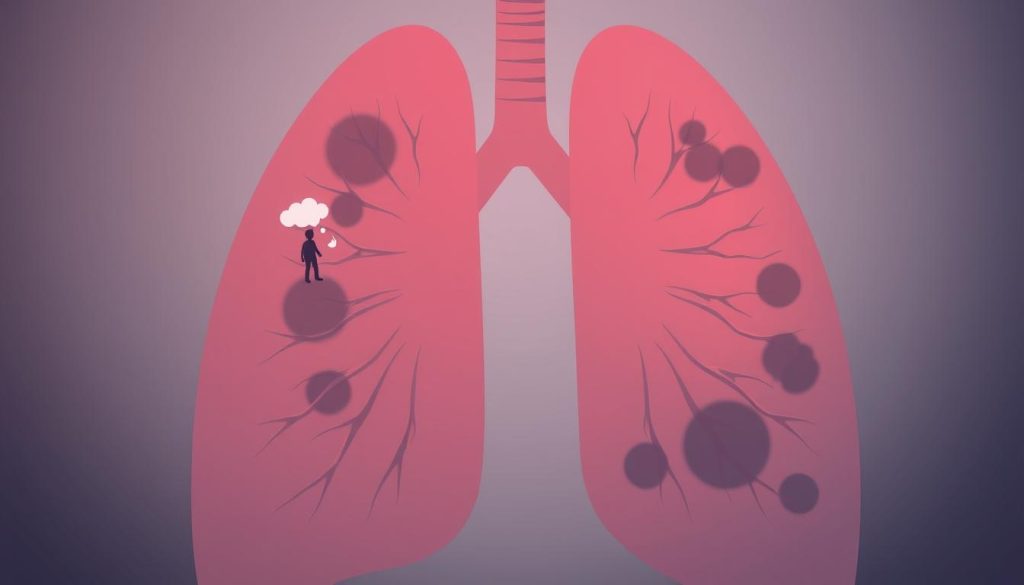
A persistent cough is a top symptom. It gets worse over time and might bring up blood or rust-colored mucus. Feeling short of breath, even when doing simple things, is another warning sign.
Chest pain that gets worse with deep breaths, coughing, or laughing could mean lung trouble. Losing weight without trying and feeling less hungry are also signs. Feeling tired and weak can make everyday tasks hard.
Wheezing, a high-pitched sound when breathing, is a concern. It happens when airways get blocked. Changes in your voice, like hoarseness, might also occur if the cancer hits the nerves in your throat.
- Recurring respiratory infections
- Swelling in the face or neck
- Clubbing of fingertips
- Bone pain, mainly in later stages
These symptoms can have many causes, not just lung cancer. But if you keep getting these signs, and you’re at risk for lung cancer, see your doctor right away.
Respiratory Changes as Warning Signs
Spotting changes in how you breathe is key to catching lung cancer early. These signs creep up slowly, making them easy to miss. Keep an eye out for any breathing changes or symptoms that don’t feel right.
Persistent Cough and Its Characteristics
A cough that lasts more than three weeks is a warning sign. It might be dry or produce mucus. If it gets worse or changes, don’t ignore it, even if you smoke.
Changes in Breathing Patterns
Shortness of breath is another important sign. You might get tired easily while doing simple tasks. Even small activities like climbing stairs or walking short distances can leave you out of breath. These changes happen slowly, so compare your current energy to how you felt a few months ago.
Wheezing and Vocal Changes
Wheezing, a whistling sound when you breathe, can mean your airways are blocked. You might also feel tightness in your chest. If your voice becomes hoarse or raspy and stays that way, see a doctor right away.
| Warning Sign | Description | Action |
|---|---|---|
| Persistent cough | Lasts over 3 weeks, may worsen | See doctor if doesn’t improve |
| Shortness of breath | Difficulty breathing during normal activities | Compare to previous months, seek medical advice |
| Wheezing | Whistling sound when breathing | Consult doctor if persistent |
Chest Pain and Discomfort Indicators
Chest pain is a serious lung cancer symptom that should not be ignored. It can feel like a dull ache or a sharp stab. Some people say it feels like pressure or tightness in their chest.
This discomfort might get worse when you breathe deeply, cough, or laugh. Not all chest pain means lung cancer. But, if the pain keeps coming back, it’s a sign to see a doctor.
It could mean tumors are pressing on nerves or spreading to the chest walls. Sometimes, it’s because of fluid buildup around the lungs. This fluid buildup can hurt when you breathe deeply or lie down.
Look out for these signs of chest pain:
- Location: Often on one side of the chest
- Duration: Lasting weeks or months
- Intensity: Varying from mild to severe
- Triggers: Worsening with specific activities
If you have chest pain that won’t go away, see a doctor. They can check your symptoms and decide if more tests are needed. Early detection of lung cancer symptoms like chest pain can help with treatment.
Blood in Cough: When to Be Concerned
Coughing up blood is a serious sign that needs quick action. It can mean many things, from small problems to serious health issues.
Types of Blood-Tinged Sputum
Blood in cough can show up in different ways:
- Pink, frothy sputum: Often linked to lung edema
- Bright red blood: May indicate recent bleeding in airways
- Dark, coffee-ground like: Could be from swallowed blood
Associated Symptoms
Look out for these signs when coughing up blood:
- Persistent cough lasting over three weeks
- Shortness of breath or wheezing
- Chest pain or discomfort
- Unexplained weight loss
Medical Emergency Signs
Get help right away if you notice:
- Large amounts of blood (more than a few teaspoons)
- Difficulty breathing or chest pain
- Dizziness or fainting
- Fever above 101°F (38.3°C)
These signs could mean a serious problem that needs quick treatment.
Physical Changes and Systemic Symptoms
Lung cancer symptoms can show up in ways beyond just breathing problems. These signs affect the whole body, showing it’s time to see a doctor. Knowing these symptoms is key for catching lung cancer early.
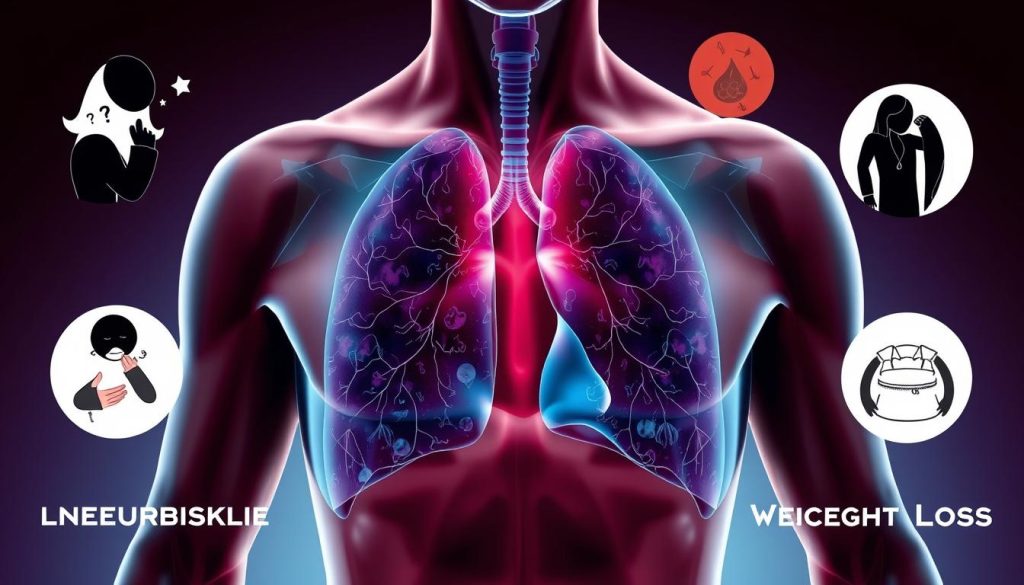
Fatigue is a common lung cancer symptom. It’s not just being tired after a long day. It’s feeling exhausted all the time, even after resting. This fatigue can make everyday tasks seem too hard.
Weight loss is another warning sign. Losing weight without trying can mean lung cancer. This happens because the body uses more energy to fight the disease, causing weight loss.
| Symptom | Description | Action |
|---|---|---|
| Fatigue | Persistent, unexplained tiredness | Consult doctor if lasting over 2 weeks |
| Weight Loss | Unintentional loss of 10+ pounds | Seek medical evaluation |
| Muscle Weakness | Decreased strength in limbs | Report to healthcare provider |
Other signs include muscle weakness, night sweats, or unexplained fever. While not all are specific to lung cancer, they need a doctor’s check if they last or come with breathing problems.
Understanding Fatigue and Weakness
Fatigue is a common symptom of lung cancer that’s often overlooked. It’s different from normal tiredness because it’s overwhelming and lasts a long time. Knowing this difference is key, as it might be an early sign of lung cancer.
Distinguishing Cancer-Related Fatigue
Cancer-related fatigue is more than just feeling tired. It’s a deep exhaustion that doesn’t get better with rest. People with lung cancer often say they feel drained, weak, or heavy.
This type of fatigue can start suddenly and last for a long time.
Impact on Daily Activities
The fatigue from lung cancer can make daily life hard. Simple tasks like getting dressed or making meals can be tough. Many people need to rest a lot during the day.
This constant tiredness can make it hard to stay active. This might make other lung cancer symptoms worse.
If you’re feeling tired for no reason and it’s affecting your daily life, see a doctor. While fatigue alone doesn’t mean you have lung cancer, it’s a symptom that shouldn’t be ignored. This is true, even if you’re not showing other signs of the disease.
Unexplained Weight Loss and Appetite Changes
Sudden changes in weight and appetite are common lung cancer symptoms. They often go unnoticed. When the body battles cancer, it burns extra energy, leading to unexplained weight loss. This weight drop can happen even when eating habits remain unchanged.
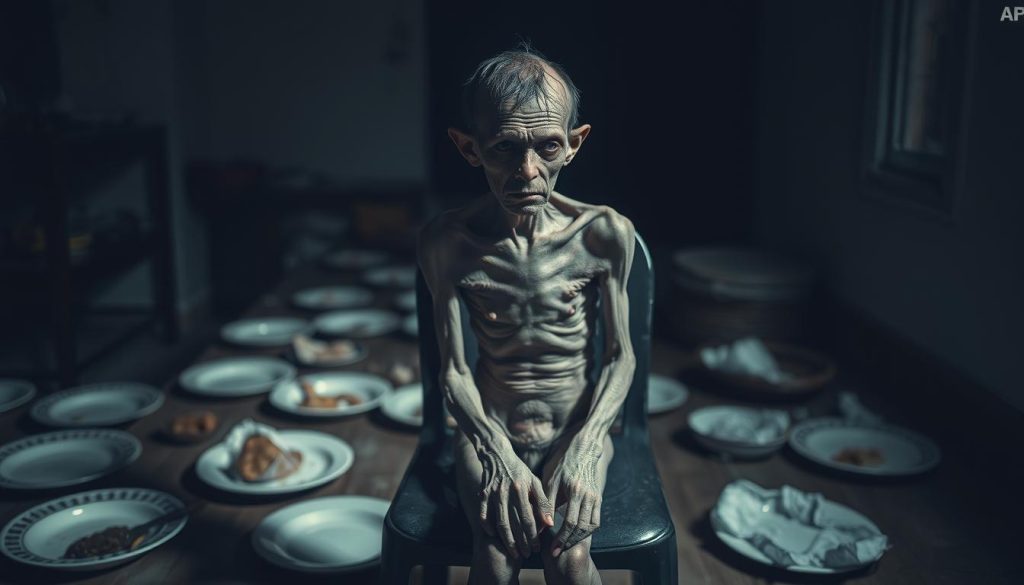
Loss of appetite frequently accompanies weight loss in lung cancer patients. People may feel full quickly or lose interest in food altogether. These changes can stem from the cancer itself or be side effects of treatments.
Pay attention to these warning signs:
- Losing 10 pounds or more without trying
- Feeling less hungry than usual
- Getting full after eating small amounts
- Experiencing nausea or vomiting
While weight loss and appetite changes can have many causes, it’s vital to consult a doctor if they persist. Early detection of lung cancer symptoms can lead to better treatment outcomes. Don’t ignore these body signals – they might be trying to tell you something important about your health.
Advanced Warning Signs and Complications
Lung cancer can get worse, showing signs that the disease has spread. It’s important to notice these signs early for the best treatment. Here are the main signs that lung cancer might be in a more advanced stage.
Metastatic Symptoms
When lung cancer spreads, new symptoms can show up. These include severe headaches, vision problems, or unexplained bruises. Chest pain gets worse as the cancer hits nearby organs.
Neurological Changes
Brain metastasis can cause brain problems. Patients might feel dizzy, confused, or even have seizures. They might also forget things or have trouble focusing.
Bone Pain Indicators
Bone pain, often in the back or hips, means lung cancer has reached the bones. This pain doesn’t go away and can get worse at night or when moving.
| Advanced Symptom | Possible Indication | Action Needed |
|---|---|---|
| Severe headaches | Brain metastasis | Immediate medical evaluation |
| Intense chest pain | Tumor growth or spread | Urgent doctor consultation |
| Persistent bone pain | Bone metastasis | Comprehensive imaging tests |
If you have any of these symptoms, like constant chest pain or brain issues, see a doctor right away. Early treatment can make a big difference in how you feel and live.
Risk Factors That Increase Symptom Awareness
Knowing the risk factors for lung cancer can make you more aware of symptoms. Lifestyle choices and environmental exposures can increase your risk.
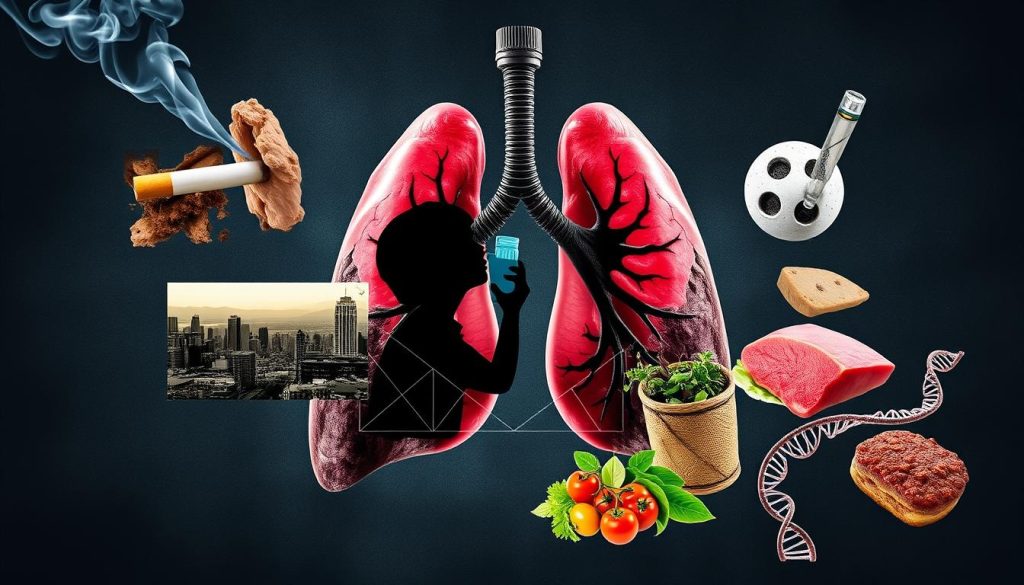
Smoking is a big risk factor. Long-term smokers are at the highest risk. But even occasional smoking can increase your chances. If you smoke, watch out for lung cancer symptoms like a persistent cough.
Being around secondhand smoke also raises your risk. Non-smokers living or working with smokers should watch for symptoms. Other risks include radon gas, asbestos, and air pollution.
| Risk Factor | Relative Risk Increase |
|---|---|
| Smoking | 15-30 times |
| Secondhand Smoke | 20-30% |
| Radon Exposure | 8-16% |
| Occupational Hazards | 10-20% |
Family history matters too. If your relatives had lung cancer, you’re at higher risk. Age and gender also play a part. Most cases are in people over 65, and men are slightly more at risk than women.
Being aware of these risks can help you notice early signs. If you have several risk factors, watch for changes in your health. Pay special attention to respiratory issues like a persistent cough or breathing problems.
When to Seek Medical Attention
Knowing when to get medical help for lung cancer symptoms is key. Early detection can greatly improve treatment results. This guide will show you when to act fast and when to make an appointment.
Emergency Situations
Some lung cancer symptoms need immediate care. If you have any of these, go to the emergency room right away:
- Severe chest pain
- Coughing up blood in large amounts
- Sudden shortness of breath
- Fainting or loss of consciousness
Scheduling Regular Check-ups
Other symptoms might not be emergencies but should see a doctor. Make an appointment if you notice:
- Persistent cough lasting more than three weeks
- Recurring respiratory infections
- Unexplained weight loss
- Chronic fatigue
Lung cancer symptoms can be hard to spot. If you’re at risk because of smoking or family history, get regular screenings. Early detection through regular check-ups can lead to better treatment options.
| Symptom | Action |
|---|---|
| Severe chest pain | Seek emergency care immediately |
| Coughing up blood | Emergency if large amounts, schedule check-up if not |
| Persistent cough | Schedule check-up if lasting over 3 weeks |
| Unexplained weight loss | Schedule check-up |
By being alert to lung cancer symptoms and getting medical help on time, you play a big role in keeping yourself healthy. Don’t be afraid to talk to your doctor about any worries.
Diagnostic Process and Testing
When lung cancer symptoms or chest pain worry you, doctors start a detailed check. They use many tests to see if you have lung cancer.
The first thing is a physical exam and talking about your health history. Your doctor will listen to your lungs and ask about your symptoms and lifestyle.
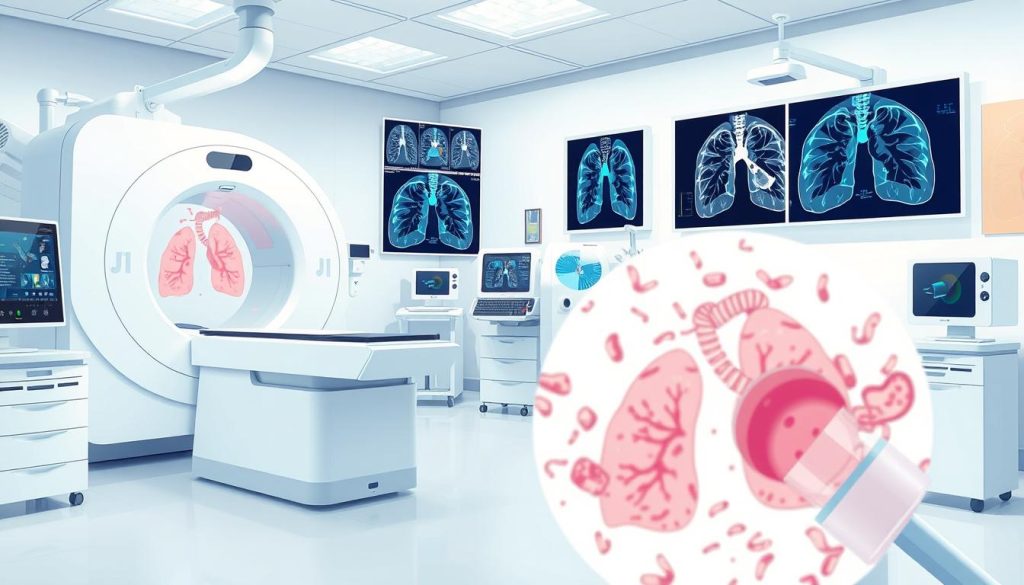
If there’s a reason to keep looking, imaging tests are used. These include:
- Chest X-rays to find any odd shapes
- CT scans for clear lung pictures
- PET scans to see if cancer has spread
If tests show something odd, a biopsy is needed. This means taking tissue samples for lab tests. There are different ways to do a biopsy:
| Biopsy Type | Description | Best For |
|---|---|---|
| Needle biopsy | Uses a thin needle to get cells | Tumors near the chest wall |
| Bronchoscopy | Looks at airways with a thin tube | Central lung tumors |
| Mediastinoscopy | A surgery to check lymph nodes | Checking if cancer has spread |
Your healthcare team will help you through this. They’ll explain each step and answer your questions. Early detection is key to better treatment for lung cancer.
Treatment Options and Early Intervention
When lung cancer symptoms like shortness of breath are caught early, treatments work better. Early action is vital for better outcomes in lung cancer patients. Let’s look at the main treatment methods.
Surgery Considerations
Surgery is often the first choice for early-stage lung cancer. Doctors aim to remove the tumor and some surrounding tissue. This helps keep as much healthy lung as possible. The surgery’s extent depends on the tumor’s size and where it is.
Radiation Therapy Options
Radiation therapy uses high-energy beams to kill cancer cells. It can be used alone or with other treatments. For those with lung cancer causing shortness of breath, radiation can help shrink tumors and ease symptoms.
Chemotherapy Protocols
Chemotherapy drugs kill cancer cells all over the body. It’s often used before or after surgery, or with radiation. Chemo can be hard on the body, but it’s a strong weapon against lung cancer.
| Treatment | Typical Use | Potential Benefits |
|---|---|---|
| Surgery | Early-stage cancer | Tumor removal, possible cure |
| Radiation | Any stage | Tumor shrinkage, symptom relief |
| Chemotherapy | Advanced or spread cancer | Systemic treatment, life extension |
Your doctor will make a treatment plan just for you. It will depend on your lung cancer type, stage, and health. Early detection and quick treatment can greatly improve your chances of beating lung cancer.
Prevention and Lifestyle Modifications
Protecting your lung health is key to avoiding lung cancer symptoms. The most important step is to quit smoking or never start. Smoking is the main cause of lung cancer, and stopping can greatly lower your risk.
Eating a diet full of fruits and vegetables boosts your immune system. It helps fight off cancer cells. Regular exercise also improves your health and lung function. This can help prevent a persistent cough or other breathing problems.
It’s vital to avoid secondhand smoke and harmful environmental pollutants. If you work in risky industries, wear the right protective gear. Regular health checks and screenings can find lung cancer early. This increases the chance of successful treatment.
By making these lifestyle changes and watching your lung health, you can help prevent lung cancer. Remember, catching symptoms like a persistent cough early can greatly improve treatment results.
FAQ
Q: What are the most common early warning signs of lung cancer?
A: Early signs of lung cancer include a persistent cough and shortness of breath. Coughing up blood, chest pain, and wheezing are also common. Fatigue, unexplained weight loss, and loss of appetite can also be symptoms. If you notice any of these, see a doctor.
Q: How can I differentiate between a regular cough and one that might indicate lung cancer?
A: A lung cancer cough lasts weeks or months without getting better. It might bring up blood or rust-colored sputum. If your cough gets worse or doesn’t go away, it’s time to see a doctor, even if you smoke.
Q: When should I be concerned about chest pain as a possible sign of lung cancer?
A: Chest pain that’s a dull ache and gets worse with deep breathing is a red flag. It doesn’t get better with pain meds. If you have new or worsening chest pain, see a doctor fast.
Q: What types of lung cancer exist, and do they have different symptoms?
A: Lung cancer types are NSCLC and SCLC. NSCLC often causes cough and chest pain. SCLC can lead to fatigue and weight loss early on. But, symptoms can vary. Always check with a doctor for any lung issues.
Q: How does smoking affect the risk of developing lung cancer?
A: Smoking greatly increases lung cancer risk, causing 80-90% of deaths. Smokers are 15-30 times more likely to get lung cancer than non-smokers. Quitting smoking lowers this risk, with benefits starting right away.
Q: Can non-smokers develop lung cancer?
A: Yes, non-smokers can get lung cancer. Other risks include secondhand smoke, radon, and asbestos. Family history and genetics also play a part. About 10-20% of lung cancers are in non-smokers, so watch for symptoms.
Q: What should I do if I’m coughing up blood?
A: Coughing up blood is serious and needs immediate care. Even a small amount could mean lung cancer or another serious issue. If you cough up more than a few teaspoons of blood, go to the emergency room. Always talk to a doctor to find out why.
Q: How is lung cancer diagnosed?
A: Diagnosing lung cancer involves several steps:
1. A doctor will examine you and review your medical history.
2. Imaging tests like chest X-rays and CT scans are used.
3. Sputum cytology checks coughed-up mucus for cancer cells.
4. Biopsy procedures collect tissue samples.
5. Molecular testing helps guide treatment.
These tests help doctors accurately diagnose and stage lung cancer.
Q: What treatment options are available for lung cancer?
A: Treatment for lung cancer depends on the type, stage, and patient factors. Common treatments include surgery, radiation, chemotherapy, targeted therapy, and immunotherapy. Often, a mix of these treatments is used. Early detection and treatment improve outcomes.
Q: How can I reduce my risk of developing lung cancer?
A: To lower lung cancer risk:
1. Quit smoking or never start.
2. Avoid secondhand smoke.
3. Test your home for radon and fix high levels.
4. Protect yourself from work-related carcinogens.
5. Eat a healthy diet with lots of fruits and veggies.
6. Exercise regularly.
7. Drink less alcohol.
8. Get screened if you’re at high risk.
While these steps help, they don’t prevent all lung cancer. Stay alert to health changes and see doctors regularly.












